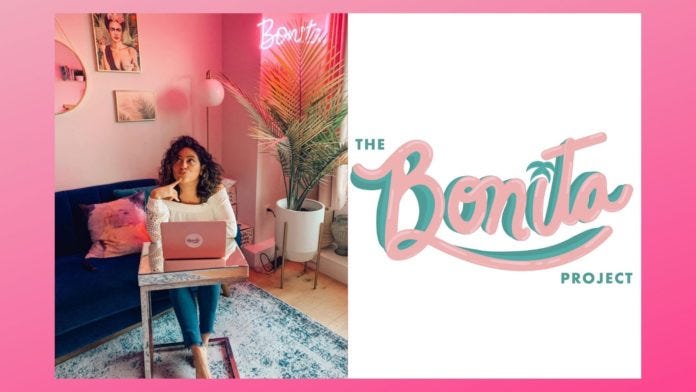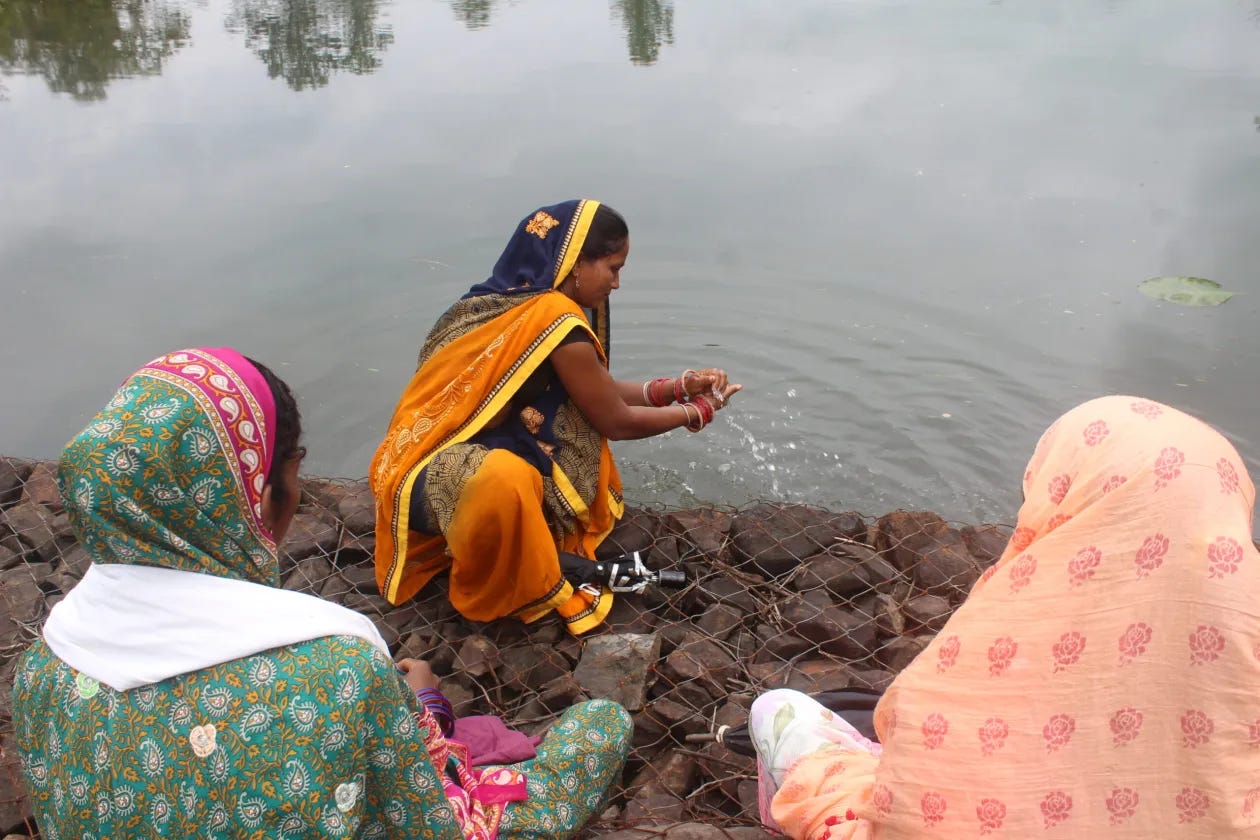Global Roundup: Queer Muslim Rom-Com, The Bonita Project, The Trans Possibilities Intensive, Women’s Collectives Tackling Water Shortages in India, LGBTQ+ Solidarity on Togolese TikTok
Compiled by Inaara Merani
Kausar Mohammed and Vico Ortiz in a scene from “The Syed Family Xmas Eve Game Night.” Credit: Courtesy of syedfamilymovie.com
In 2021, a study found that out of 8965 speaking roles in films, only 1.6 percent of the characters were Muslim and only one character identified as LGBTQ+. These numbers are alarming and speak to the lack of diversity and representation in the mainstream media. However, a new short film is challenging these practices.
The Syed Family Xmas Eve Game Night premiered last month at TIFF, and is now streaming online and in-person at the Chicago International Film Festival. Directed by Fawzia Mirza and written by and starting Kausar Mohammed, the film follows a queer Muslim Pakistani woman, Noor, who brings her Puerto Rican girlfriend, Luz, home for the first time to her family’s annual game night.
I have two [older] sisters whom I love very, very, much. I also have a partner that I love very much, my girlfriend. The first Christmas that I introduced my partner to my middle sister, everything was great. But being there and having the anxiety of bringing someone you love to meet someone you look up to so much, it had my mind thinking up all these things that could go wrong. A Taboo game going wrong was one of them, so was a chai battle. That’s how I came up with the idea for this short. - Kausar Mohammed, writer and actor
Similar to other marginalized individuals, the experiences and stories of entire communities are often homogenized into a single category, leaving no room to understand the diversity of each individual. Stemming from a place of racism and xenophobia, Muslim experiences are usually viewed from the same lens.
I think the thing we can do is always be specific, and that specificity brings out the universal aspects. In this case, the specificity of having a Pakistani writer and director, we’re bringing that experience, though not all of our actors are necessarily Pakistani. That kind of specificity allows us to really dig in and tell this story, and that becomes universal across experiences. - Fawzia Mirza, Director
This feel-good short film embodies diversity, inclusion, and love; most importantly, it centralizes the authentic queer, Muslim experience. In a world where the queer Muslim community has little to no representation, The Syed Family Xmas Eve Game Night shows that everyone’s experiences matter, and every diverse story deserves to be told.
It’s so important for us to be at the centre of the story. Truly, our mission is to have queer, Muslim, POC protagonists. If we were talking even six months ago, or three months ago, it’ would be a different conversation. In this moment, it’s exciting to see things like Bilal Baig’s show, Sort Of, now being picked up by HBO and the CBC, and there’s another great show being shot based off a memoir by [Amrou Al-Kadhi], a Muslim drag queen. And that’s still only two folks out of our vast Muslim empire. That is so fresh and new that we haven’t even gotten to see those stories yet...There’s so much to be done, and this is just a step in the process and that’s exciting. - Fawzia Mirza, Director
Trailer:
Photo courtesy of belatina.com via BeLatina
The Bonita Project is a Latina-owned and operated PR company which is breaking barriers to reach women of all backgrounds. The Bonita Project creates and implements strategic press and influencer outreach to elevate emerging brands and assist them in engaging with multicultural populations.
Founder Danielle Alvarez never saw herself represented in multicultural marketing; she wants to change the way that brands approach this diverse customer base, and also wants to disrupt the conversation around marketing to Latinas.
My goal with The Bonita Project since Day 1 was to work with brands that carried intention and were passionate about marketing to the Latinx community. I also knew I wanted to build a community on social media, and that’s how the Instagram platform came about. I saw there was an opportunity to build a platform where I could highlight how diverse the Latinx community is and have the bigger brands take notice. And it has worked! A lot of the business I receive today is thanks to the Instagram page. I use the platform to educate, inspire, and take action to support the Latinx community. - Danielle Alvarez, Founder of The Bonita Project
When it comes to the Latinx community, many companies often fail to adequately connect and provide appropriate representation. Alvarez wants to ensure that the Latinx community is not homogenized into a single category, but is rather celebrated for their diverse identities and cultures.
Currently, The Bonita Project is in the process of expanding the team to handle incoming work. The new business is also looking to expand their social media presence beyond Instagram, and promulgate more Latinx content across the US to highlight the Latinx experience in the diaspora.
Instagram video:
Tourmaline; Sam Feder. Getty Images via them.us
Sundance Institute is a nonprofit organization which strives to highlight independent film and media. The organization runs the annual Sundance Film Festival, and recently launched its latest fellowship program on Monday: the Trans Possibilities Intensive.
This three-day long virtual program hosts six trans filmmakers of colour and supports the development of their projects through events, talks, and group work. The inaugural class of participants includes Ava Davis (The Waltz), StormMiguel Florez (Welcome To Roswell), River Gallo (Ponyboi), Carol Grant (Eurydice V), Mitchell “MiSha” Owens (The Boy from Across Town), and Savannah Ward (Meta).
The fellows are joined by a group of LGBTQ+ filmmakers, including Sam Feder, Tourmaline, Yance Ford and Moi Santos, as well as Moi Santos who is a coordinator for indigenous outreach and inclusion programs at Sundance Institute.
This Intensive is the result of ongoing and evolving priorities through Sundance’s Outreach and Inclusion work and a year of thoughtful and intentional planning, heartfelt commitment and a belief in supporting transgender storytellers of color and their stories. - Moi Santos, Coordinator
Before the intensive was launched, Santos had collaborated with GLAAD to increase trans awareness training at Sundance. From this collaboration, a toolkit was created for entertainment leadership and creators, which will be available publicly next month.
Although trans representation on-screen is in need of improvement, this intensive is a step in the right direction. The Trans Possibilities Intensive offers a number of emerging filmmakers the opportunity to advance their careers, while simultaneously creating the blueprint for other industry leaders to do the same.
Source: Feminism in India
In the village of Partala Panchayat in Madhya Pradesh, India, hundreds of residents underwent agricultural skill enhancement training. Hosted by PRADAN, an organization dedicated to enact sustainable change in rural India, in partnership with the IKEA Foundation, this training program aimed to increase livelihood, and to enhance gender equality; leadership quality; and confidence among Partala residents.
The program began in 2010, and as a result, in 2012 the Integrated Watershed Management Programme (IWMP) and the Integrated Natural Resource Management (INRM) approach were implemented. These approaches fostered sustainable methods of water conservation and collection. This encouraged women to take ownership in their villages and resulted in an increased crop yield.
Nestled amidst high mountains and vast stretches of barren land, the INRM activity paved the way to ensure land and water development in Partala village, allowing farmers to cultivate on otherwise fallow land and increasing productivity and livelihood opportunities in the village. The planning for land and water development works paved the way for women to take onus for the development of the village, pushed them into the governance arena where they have now stood up to ask for their rights and entitlements in the Gram Sabha. The strengthening of women collectives also pushed forth agendas like nutritional wellbeing and drinking water shortage, the first was addressed through collective led processes and planning to set up nutrition gardens in the village and the second through a series of requests to get the Nal Jal Yojana in the village. - Neeraj, Block Coordinator for PRADAN Narayanganj
Prior to the program, participants reported feeling as if men dominated the public sphere and women only served domestic purposes. With the introduction of new agricultural and livelihood practices, women in Partala Panchayat have been able to maintain their own businesses, utilizing the methods they learned in the PRADAN training program. Over the years, the women of Partala Panchayat have turned their infertile property into fertile land, and some now own and operate their own gardens and fields.
via OpenDemocracy
In Togo, homosexuality is criminalized, gender roles are rigid, and the “promotion of immorality” (including LGBTQ+ identities) is banned. Expressing oneself authentically in a public setting could result in harsh consequences for members of the LGBTQ+ community, however some people are turning to online spaces to express themselves, challenge gender norms, and show solidarity with the LGBTQ+ community.
Nono L’Arcadien is a young Togolese TikToker with around 37,000 followers on the platform. Creating videos where he does his hair and makeup, L’Arcadien is not afraid to post these videos online. Although he started making TikTok videos for fun, his following quickly grew. L’Arcadien realized that his platform could be used to share his talents and perspectives to a wider audience. Although a pride flag can be seen in many of his videos, L’Arcadien does not address his sexuality or gender identity online.
Another TikToker from Togo, Kalisha LaBlanche, was forced to move out of her mother’s home because of her sexuality, and a priest also declared war on her.
A few months ago, my mother forced me to go to a pastor for so-called prayer and deliverance sessions. She believed I was really under the influence of an evil spirit. - Kalisha LaBlanche
Although her mother eventually gave up on these conversion sessions, it took a large toll on her mental health. TikTok was a safe escape where LaBlanche was connected with other members of the LBGTQ+ community and allies.
Article 88 of Togo’s penal code states that anyone who commits an “indecent or unnatural act with an individual of his or her own sex” will be punished by imprisonment for up to three years and a fine of up to 500,000 francs.
In their daily life, LGBT people in Togo (and even those merely suspected of being gay) face insults and sometimes physical attacks.
Social media can be a platform for expression of one’s sexuality, but it can still be a dangerous place. Amidst physical and verbal violence in-person, these young TikTokers have also been victim to harsh comments online. Although this experience has been a difficult one for the queer Togolese community, those who have spoken out have inspired others to raise awareness, and use their voices to express themselves authentically on TikTok.
TikTok videos:
Inaara Merani (she/her) is a recent graduate from the University of Ottawa where she studied International Development and Globalization with a minor in Women’s Studies. She is an Ismaili Muslim Canadian who is deeply passionate about human rights, social justice and feminism, and in turn, dismantling the patriarchy and ensuring that all women have safe and equal access to all their rights. She hopes to pursue a career in law so that she can continue to fight for the rights of women and other marginalized groups everywhere. She also enjoys reading, travelling and spending time with her beautiful cat.









